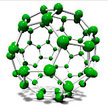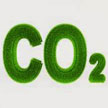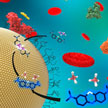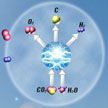Showing Spotlights 49 - 56 of 150 in category All (newest first):
 Against the double-whammy backdrop of an energy challenge and a climate challenge it is the role of innovative energy technologies to provide socially acceptable solutions through energy savings; efficiency gains; and decarbonization. Nanotechnology It may not be the silver bullet, but nanomaterials and nanoscale applications will have an important role to play. This article provides an overview of the issues and nanomaterials and applications that are being researched in the field of energy.
Against the double-whammy backdrop of an energy challenge and a climate challenge it is the role of innovative energy technologies to provide socially acceptable solutions through energy savings; efficiency gains; and decarbonization. Nanotechnology It may not be the silver bullet, but nanomaterials and nanoscale applications will have an important role to play. This article provides an overview of the issues and nanomaterials and applications that are being researched in the field of energy.
Jul 23rd, 2015
 Putting some of the rising amounts of carbon dioxide in the atmosphere to good use again, researchers are looking for ways to convert atmospheric CO2 emissions into industrially relevant, valuable chemicals and fuels; ideally powered by clean, renewable energy sources to make the whole process carbon-negative or at least carbon-neutral, i.e. by using at least - if not more - CO2 than is created in the process. New work demonstrates that current, state-of-the-art renewable energy sources can efficiently power large-scale CO2 conversion systems.
Putting some of the rising amounts of carbon dioxide in the atmosphere to good use again, researchers are looking for ways to convert atmospheric CO2 emissions into industrially relevant, valuable chemicals and fuels; ideally powered by clean, renewable energy sources to make the whole process carbon-negative or at least carbon-neutral, i.e. by using at least - if not more - CO2 than is created in the process. New work demonstrates that current, state-of-the-art renewable energy sources can efficiently power large-scale CO2 conversion systems.
Jul 20th, 2015
 Meeting the need for a reliable, sensitive, and accurate methodology for the detection of nanoparticles in complex samples, using low-cost and portable instrumentation, scientists have developed a novel methodology to quickly screen for the presence and reactivity of nanoparticles in commercial, environmental, and biological samples. A colorimetric assay - similar to a swimming pool test kit - tests for the presence or absence of nanoparticles in biological and environmental relevant samples with sufficient sensitivity at part per billion concentration levels.
Meeting the need for a reliable, sensitive, and accurate methodology for the detection of nanoparticles in complex samples, using low-cost and portable instrumentation, scientists have developed a novel methodology to quickly screen for the presence and reactivity of nanoparticles in commercial, environmental, and biological samples. A colorimetric assay - similar to a swimming pool test kit - tests for the presence or absence of nanoparticles in biological and environmental relevant samples with sufficient sensitivity at part per billion concentration levels.
Feb 20th, 2015
 At the end of their product life cycle, nanomaterials can enter waste treat ment plants and landfills via diverse waste streams. Little, however, is known about how nanomaterials behave in the disposal phase and whether potential environmental or health risks arise. The current assumption is that stable nanoparticles are neither chemically nor physically altered in waste incineration plants and that they accumulate especially in the residues (e.g. slag). These residues are ultimately dumped. The disposal problem in the case of stable nanoparticles is therefore merely shifted to the subsequent steps in the waste treatment process.
At the end of their product life cycle, nanomaterials can enter waste treat ment plants and landfills via diverse waste streams. Little, however, is known about how nanomaterials behave in the disposal phase and whether potential environmental or health risks arise. The current assumption is that stable nanoparticles are neither chemically nor physically altered in waste incineration plants and that they accumulate especially in the residues (e.g. slag). These residues are ultimately dumped. The disposal problem in the case of stable nanoparticles is therefore merely shifted to the subsequent steps in the waste treatment process.
Jan 27th, 2015
 Military organizations around the world, especially in the U.S., have been quicker than most to appreciate the potential of nanotechnology. More money is being spent on nanotechnology research for military applications than for any other area. Public releases about military nanotechnology research and development activities are full about sensors, batteries, wound care, filtration systems, smart fabrics, and lighter, stronger, heat-resistant nanocomposite materials etc. Naturally, nanomaterial safety has become an important issue for military organizations as well.
Military organizations around the world, especially in the U.S., have been quicker than most to appreciate the potential of nanotechnology. More money is being spent on nanotechnology research for military applications than for any other area. Public releases about military nanotechnology research and development activities are full about sensors, batteries, wound care, filtration systems, smart fabrics, and lighter, stronger, heat-resistant nanocomposite materials etc. Naturally, nanomaterial safety has become an important issue for military organizations as well.
Jan 6th, 2015
 Researchers have successfully attempted to simultaneously co-generate hydrogen and solid carbon fuels from a mixed hydroxide/carbonate electrolyte in a 'single-pot' electrolytic synthesis at temperatures below 650 C. This is the first demonstration of the co-generation of hydrogen and carbon fuels at a single electrode and from a molten electrolyte. Here, fuel production can be driven entirely by solar energy using the STEP process in which solar thermal energy increases the system temperature to decrease electrolysis potentials.
Researchers have successfully attempted to simultaneously co-generate hydrogen and solid carbon fuels from a mixed hydroxide/carbonate electrolyte in a 'single-pot' electrolytic synthesis at temperatures below 650 C. This is the first demonstration of the co-generation of hydrogen and carbon fuels at a single electrode and from a molten electrolyte. Here, fuel production can be driven entirely by solar energy using the STEP process in which solar thermal energy increases the system temperature to decrease electrolysis potentials.
Jan 5th, 2015
 Drawing attention to the possible implications of extreme weather does not answer the question what we can really do about the risks of climate change, and who will drive fresh solutions. Science - including nanotechnology - is an important part of the answer, and we need human ingenuity to step forward. To accelerate the process and help to push the boundaries of usable energy solutions, the Exergeia Project backs potentially groundbreaking inventions and innovations in all fields of alternative energy.
Drawing attention to the possible implications of extreme weather does not answer the question what we can really do about the risks of climate change, and who will drive fresh solutions. Science - including nanotechnology - is an important part of the answer, and we need human ingenuity to step forward. To accelerate the process and help to push the boundaries of usable energy solutions, the Exergeia Project backs potentially groundbreaking inventions and innovations in all fields of alternative energy.
Dec 5th, 2014
 A new review article examines opportunities and practical challenges that nanotechnology applications pose in addressing the guiding principles for a green economy. There is a general perception that nanotechnologies will have a significant impact on developing 'green' and 'clean' technologies with considerable environmental benefits. The associated concept of green nanotechnology aims to exploit nanotech-enabled innovations in materials science and engineering to generate products and processes that are energy efficient as well as economically and environmentally sustainable.
A new review article examines opportunities and practical challenges that nanotechnology applications pose in addressing the guiding principles for a green economy. There is a general perception that nanotechnologies will have a significant impact on developing 'green' and 'clean' technologies with considerable environmental benefits. The associated concept of green nanotechnology aims to exploit nanotech-enabled innovations in materials science and engineering to generate products and processes that are energy efficient as well as economically and environmentally sustainable.
Nov 18th, 2014
 Against the double-whammy backdrop of an energy challenge and a climate challenge it is the role of innovative energy technologies to provide socially acceptable solutions through energy savings; efficiency gains; and decarbonization. Nanotechnology It may not be the silver bullet, but nanomaterials and nanoscale applications will have an important role to play. This article provides an overview of the issues and nanomaterials and applications that are being researched in the field of energy.
Against the double-whammy backdrop of an energy challenge and a climate challenge it is the role of innovative energy technologies to provide socially acceptable solutions through energy savings; efficiency gains; and decarbonization. Nanotechnology It may not be the silver bullet, but nanomaterials and nanoscale applications will have an important role to play. This article provides an overview of the issues and nanomaterials and applications that are being researched in the field of energy.

 Subscribe to our Nanotechnology Spotlight feed
Subscribe to our Nanotechnology Spotlight feed





